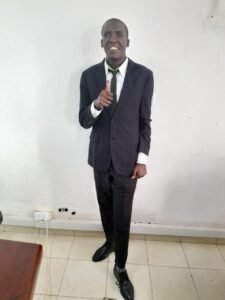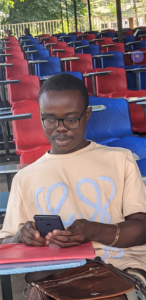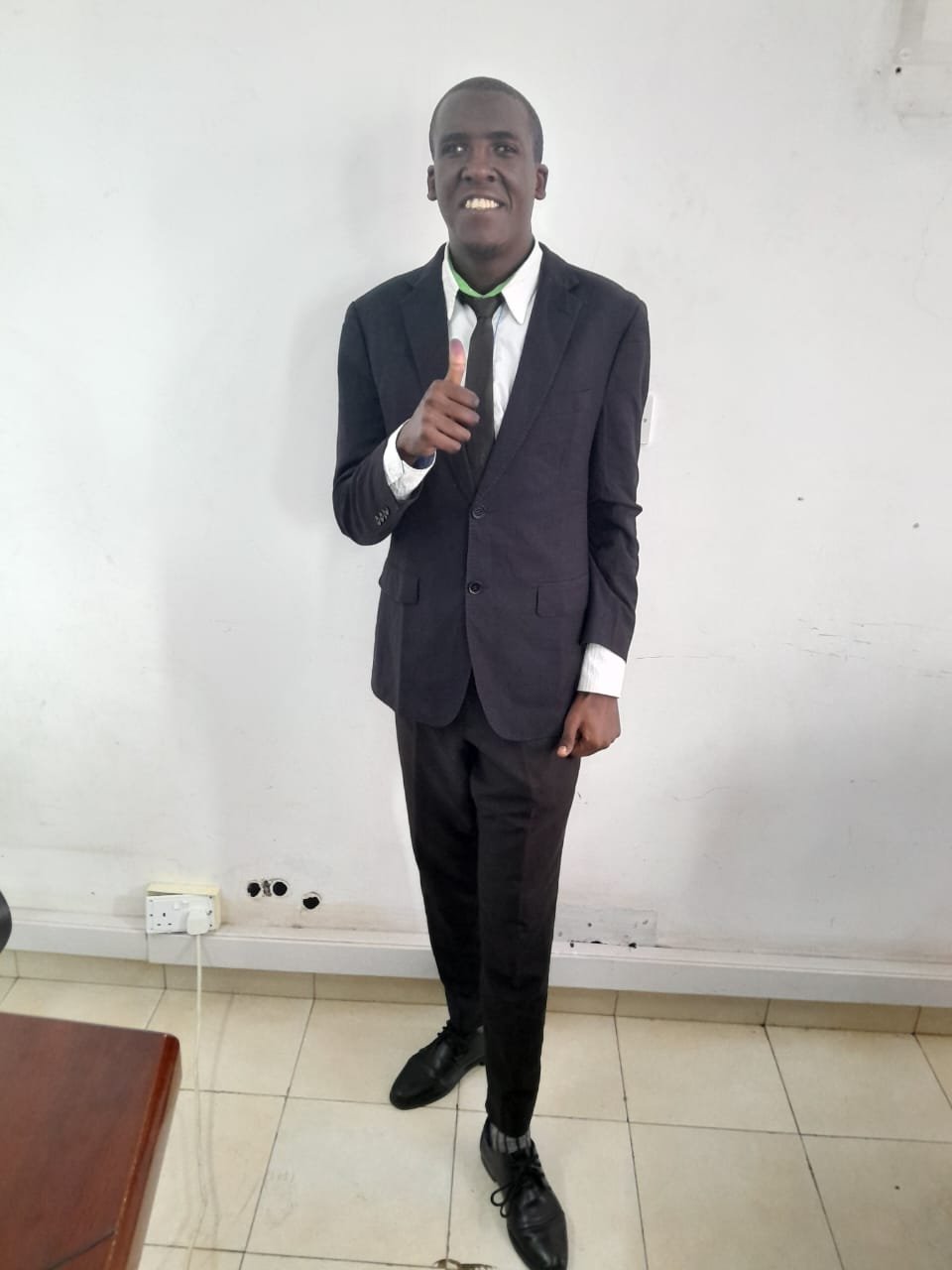Princeley Njukang, Cameroon.
Just when most visually impaired Africans felt that forgetting what sight offers is a good peel to contend stigma, Google Lookout is giving them something better to think about. Instead of battling with how to challenge stigma, they can also see, and this is thanks to the Google Lookout application. Using the said Application, they are able to seamlessly read text, identify objects, images and currencies, opening the gate-way to independent living. “I used to depend on others to read things for me, and to help me navigate my environment. But since I started using Lookout, I’m now able to work on my own,” says Kenya’s Nairobi city based visually impaired Edwin Omulama.
Edwin, who completely lost his sight 15 years ago knew that total blindness was ushering him in to a world of inaccessible information. Despite being introduced to a writing widely used by blind people, Braille, shortly after developing vision impairment, Edwin carefully explains that they have a hard time accessing information in Kenya, and this is not different elsewhere in Africa.
“It was not easy, moving from independence to dependence,” he says, adding that having to depend on his sighted peers for everything meant surrendering his privacy.

For most visually impaired persons residing in Africa, using a smart phone is not a right but a massive achievement. This is because of limited inclusive technologies in the continent, and that’s not all: Zero universal design, poor internet infrastructure, and the stereotypical belief that blindness means incapacity continues to play negatively on their inclusion. Edwin says his journey to acquiring a smartphone, which has unlocked the possibilities engineered by Google Lookout, was one filled with obstacles. “I was introduced to screen reader-assisted computers when I went to Thika High School for the blind, but it took years for me to be introduced to smartphones and Google Talkback.”
According to Edwin, Google Lookout is an important complement for Google Talkback. “I think Lookout was developed to enhance the independence of visually impaired phone users because with Google Talkback, there were still many things we could not do such as reading scanned documents.” Edwin, who is a musician and an influencer for the Inclusive African conference on digital technology convened annually by inABLE, a not for profit organization in Nairobi, claims that with Lookout, he can do as much as identifying his staff members.
Another visually impaired lady also residing in Nairobi, Grace Lillian Murugi says her life now almost completely depends on the application. “I love styling clothes and since I got Lookout, it has really helped me. I use it when styling my hair, cooking, and navigating my environment,” she explains. “Lookout has enabled me to do the things people said I would never be able to do when I lost my sight at the age of 11.”

A Political Science student with visual impairment in the University of Buea, Cameroon, Fraisnel Bayuga affirms that he is only able to navigate educational challenges thanks to his exposure to Google Lookout’. “We’re in a system where lecturers only produce handouts in print. Even when E-handouts are produced, they often come as scanned documents,” he reveals. “It’s thanks to Lookout that we can have some marginal access to educational content.
How Lookout works
Google Lookout was launched in 2018 to advance A I and make the world more accessible for people who are blind and those with low vision. An Android app, Lookout is available globally, uses AI, computer vision, and augmented reality to provide people with an additional tool to make their day-to-day life easier. “Using the app, you are able to use different modes to do everything from detecting obstacles like people or objects in your environment, identifying certain food items, reading text and documents, or exploring a new place,” Sejal D’souza, Lookout’s Product Manager tells DNA in an exclusive interview.
Lookout is globally available in 34 languages, including Arabic, English, French and Portuguese, which are widely used across Africa. However, Sejal affirms that Google is not ignorant of Africa’s linguistic diversity, and that there’re opportunities for further localization.
Challenges and recommendations from African users
Google Lookout was launched in 2018 to advance A I and make the world more accessible for people who are blind and those with low vision. An Android app, Lookout is available globally, uses AI, computer vision, and augmented reality to provide people with an additional tool to make their day-to-day life easier. “Using the app, you are able to use different modes to do everything from detecting obstacles like people or objects in your environment, identifying certain food items, reading text and documents, or exploring a new place,” Sejal D’souza, Lookout’s Product Manager tells DNA in an exclusive interview.
Lookout is globally available in 34 languages, including Arabic, English, French and Portuguese, which are widely used across Africa. However, Sejal affirms that Google is not ignorant of Africa’s linguistic diversity, and that there’re opportunities for further localization.
Challenges and recommendations from African users
For African users, the cry for Lookout to be improved and made more relevant to the continent keeps loudening. “I want to be able to use it to dictate the Kenyan Shilling and other African Currencies,” Grace Lillian Murugi says. She adds that the app has to be regularly improved, so as to reduce its level of identification errors, and Edwin Omulama agrees: “There was this time I was pointing at a bike, but it kept saying tires. I mean, you will be pointing at a bed, and Lookout will say it’s a window.”
Fraisnel Bayuga believes that though much has been done to make Lookout more useful, much is yet undone. “Lookout sometimes changes the order of documents, leading to incoherent and unintelligible reading.” He recommends the addition of audio camera direction capabilities, to let visually impaired users know whether they are positioning the camera well, especially when trying to capture documents.
In the exclusive interview with DNA, Lookout’s Product Manager, Sejal D’Souza, reveals that through work with the Google Community, they’ve continued to directly incorporate feedback to improve the design and available modes in the app. “For example, earlier this year we launched “Find Object mode” as a result of requests from users who wanted to have the ability to find specific objects around them.” This adds to existing modes such as Quick Read, Scan Document, Images and Explore, which allow users to perform diverse functions. Now that fresh challenges have been raised by African users, the Google Lookout team would have known just how important the application is to millions of blind and low vision people in the continent.
/Important statistics and key points
In Africa, an estimated 15.3%, or 26.3 million people live with one form of visual impairment or the other, according to the WHO Regional Office for Africa. While 5.9 million people live with total blindness, 20.4 million people live with low vision. Leaders of organizations of persons with disabilities in the continent believe that Google is yet to fully maximize the potentials of this significant market. The usefulness of Google’s accessible products, such as Lookout, they say, is limited to a few educated persons in urban centers. “Strong partnerships with indigenous organizations that understand and care for persons with disabilities will go a long way in strengthening the impact of Google’s solutions in the continent,” Says Peter Ngong, President of Hope Social Union for the Visually Impaired (HSUVI,) an organization of Blind and partially sighted persons in Bamenda, Northwest region of Cameroon. The disability leader adds that there’s a need for visually impaired Africans to be schooled on the existence of Lookout and other Google products designed to make their lives better.
Nigerian visually Impaired Google Accessibility Influencer, Ayoola Efunkoya, says the expensive nature of smartphones is a huge barrier for most people hoping to enjoy the benefits of Lookout. “Premium brands known for accessibility are often out of reach, forcing users towards options with potentially weaker support.”
Lookout’s Product Manager, Sejal D’Souza insists that they are working tirelessly, along with partner organizations, to make the product more useful for the visually impaired community. “We are continuing to explore different ways that Lookout can be helpful across regions, including within Africa. We encourage people to submit feedback, and we will continue to find new ways that we can work with communities locally,” she promises.
In Africa, an estimated 15.3%, or 26.3 million people live with one form of visual impairment or the other, according to the WHO Regional Office for Africa. While 5.9 million people live with total blindness, 20.4 million people live with low vision. Leaders of organizations of persons with disabilities in the continent believe that Google is yet to fully maximize the potentials of this significant market. The usefulness of Google’s accessible products, such as Lookout, they say, is limited to a few educated persons in urban centers. “Strong partnerships with indigenous organizations that understand and care for persons with disabilities will go a long way in strengthening the impact of Google’s solutions in the continent,” Says Peter Ngong, President of Hope Social Union for the Visually Impaired (HSUVI,) an organization of Blind and partially sighted persons in Bamenda, Northwest region of Cameroon. The disability leader adds that there’s a need for visually impaired Africans to be schooled on the existence of Lookout and other Google products designed to make their lives better.
Nigerian visually Impaired Google Accessibility Influencer, Ayoola Efunkoya, says the expensive nature of smartphones is a huge barrier for most people hoping to enjoy the benefits of Lookout. “Premium brands known for accessibility are often out of reach, forcing users towards options with potentially weaker support.”
Lookout’s Product Manager, Sejal D’Souza insists that they are working tirelessly, along with partner organizations, to make the product more useful for the visually impaired community. “We are continuing to explore different ways that Lookout can be helpful across regions, including within Africa. We encourage people to submit feedback, and we will continue to find new ways that we can work with communities locally,” she promises.
Edited by Princely Kesah.
